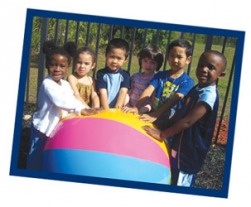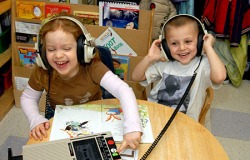What is emotional literacy?

Emotional literacy is the ability to recognize, understand, and express our emotions in an appropriate way. Emotions influence our thoughts and actions, inspire our needs, affect our bodies, and have an impact on our relationships. Through our emotions we respond to life in many different ways such as anger, happiness, fear, love, and loneliness.
"A child has a sensitive period which lasts until he is almost five years old and which enables him to assimilate images from his environment in a prodigious fashion. He is an observer truly actively receiving these images through his senses."
--Maria Montessori (1966)
Why teach emotional literacy?
Part of social and emotional development is building emotional literacy. Children should become aware of their emotions and be able to express them in a non violent way. We must know how to communicate our feelings in order to get the emotional support and understanding we need from others, as well as to show our emotional support and understanding to them. This gives the individual greater insight into their own behavior, and helps them choose actions which produce positive outcomes and feelings. It also gives the student planning skills and greater self-confidence to execute plans and achieve goals. For the student this results in higher self-esteem. It also reduces negative choices which lead to bad outcomes, feelings and low self-esteem.
"Emotional literacy can tackle gang culture"
TEACHING children to control their emotions could stop us creating a society of gangsters, an educational leader said today. People attending a conference on "emotional literacy" in education and adulthood stood in silence for one minute to remember the children killed in recent gun crime incidents. Dr Larry Jones, director of studies at The London Academy for Higher Education, told the conference in East Ham, east London: "I don't think emotional literacy is being taken very seriously in this country. The Government should encourage us to educate ourselves and others emotionally." The Academy, based in Stratford, east London, is trying to raise awareness of the emotional literacy program, which tells children how to raise their self-esteem and withstand peer pressure and the dominance of gangs. Emotional literacy created many benefits, including reduction of crime, fewer dysfunctional families, and economic development. Dr. Jones said: "We need to change the way we look at life, to teach that you don't need to fight to be a man, there's no need for you to use a gun or a knife."
*Part of article taken from: http://www.manchestereveningnews.co.uk/news/education/s/236/236471_emotional_literacy_can_tackle_gang_culture.html
The following would be included among the topics in a more complete emotional literacy curriculum:

Self-awareness. Building a vocabulary for feelings; knowing the relationship between thoughts, feelings and reactions; knowing if thought or feeling is ruling an action.
Decision-making. Examining actions and knowing their consequences; a self-reflective view of what goes into decisions; applying this to issues such as sex and drugs.
Managing feelings. Monitoring ''self-talk" to catch negative messages such as internal put-downs; realizing what is behind a feeling (e.g. the hurt that underlies anger).
Self-concept. Establishing a firm sense of identity and feeling esteem and acceptance of oneself.
Handling stress. Learning the value of exercise, guided imagery, and relaxation methods.
Communications. Sending "I" messages instead of blame; being a good listener.
Group dynamics. Cooperation; knowing when and how to lead, when to follow.
Conflict Resolution. How to fight fair with other kids, with parents, and with teachers; the win-win model for negotiating compromise.
*Reference: http://www.kidseq.com/articles/emotionsgoleman.php

